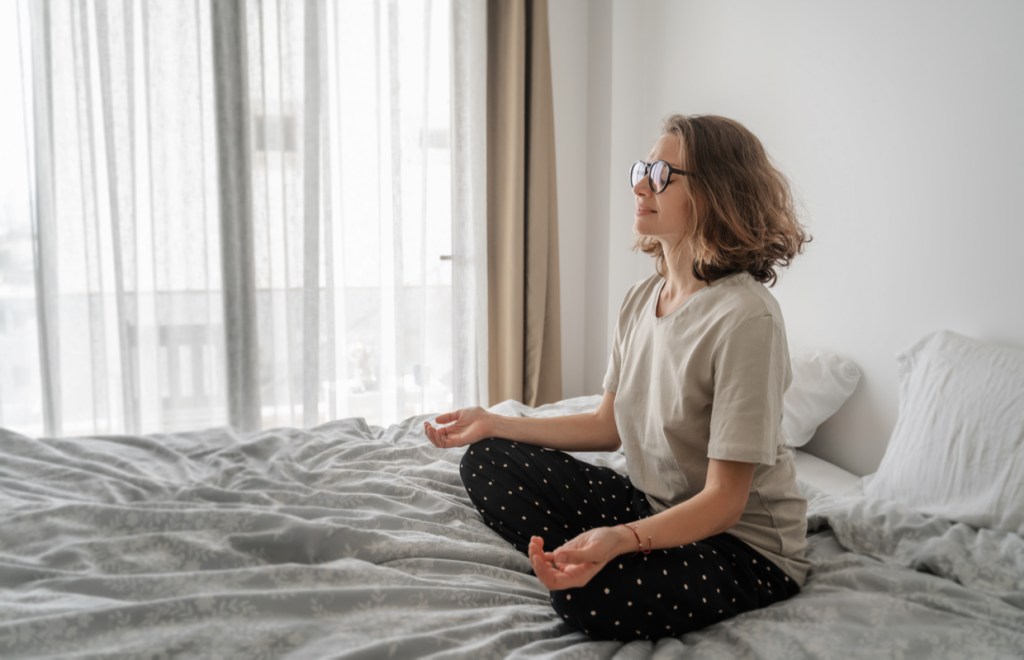New beginnings: how to beat bad habits
How do you create a truly fresh start for yourself without doubt, cynicism and old habits kicking in? Anita Chaudhuri investigates how to beat your bad habits and welcome fresh, new beginnings with open arms...

There’s nothing like a fresh start, a blank page, a chance to begin again. It’s always great to be given a second chance, but how can we ensure that we will definitely commit to creating real change this time, instead of procrastinating and frittering away precious hours binge-watching Nordic noir box sets – or maybe that’s just me? We need to learn how to beat bad habits once and for all so we can embrace new beginnings.
My problem is that I am usually overwhelmed by too many over-ambitious goals – the completion of that final book draft, a new fitness regime and a photography project to name but three. Add to the mix a chronic allergy to life admin and you have a recipe for chaos.
I was about to write, with a straight face, that I don’t have enough time for fresh starts, but that would be a lie. What I have, in fact, is a surfeit of time. Working from home means that my nine-to-five is unstructured; my work day a shiny block of marble waiting to be chiseled into meaningful form.

Are you starting your days with procrastination?
Every morning, I struggle to get started and, before I know it, two hours have vanished. Then I panic and flap into action. By the time lunchtime rolls around, I tell myself that I don’t have time to make a proper lunch or go to the gym because I need to catch up.
Clearly, some strategic advice is needed, so I seek coaching from Hal Elrod, author of The Miracle Morning (Hodder & Stoughton, £9.99). If anyone can help me, surely it’s him. Elrod has had an impressive number of new beginnings in his life, including complete recovery from a car crash that left him for dead, the collapse of his business after the 2008 financial crash and, more recently, his recovery from acute lymphoblastic leukaemia, which only has a 30 per cent survival rate.
How can you keep starting over with optimism when your past has been so challenging? Elrod believes everything starts with intention. ‘Throughout everything I’ve been through, every day I made a simple choice, to be the happiest and most grateful I’ve ever been, even if I was also enduring the most difficult time of my life. How we feel doesn’t have to be dependent on what’s going on around us, rather, it’s dependent on what’s going on inside us.’
What is the Miracle Morning routine?
The Miracle Morning (MM) offers a simple six-step template to create a productive beginning to your day. What is it about mornings that are so important? Why not a Miracle Afternoon or a Miracle Evening? ‘How you start anything sets the tone of that thing,’ says Elrod. ‘Say you’re running a race, and you get off to a terrible start, that will affect your mindset, hinder your momentum and make it that much more difficult to win. Similarly, how you start your day sets the overall tone, direction and context.’
By way of example, Elrod mentions that the majority of people hit the snooze button when their alarm goes off. ‘Do that and you are literally starting your day with procrastination. That sets the compass to procrastinate for the rest of the day.
On the other hand, if you commit to waking up at a certain time and then you overcome the initial inertia, you’re starting with discipline. Discipline is one of the most important attributes to achieving anything in life. If you start out with it, then it will spill over into the choices you make later in the day, like whether or not you exercise and eat healthily.’
Since I’ve mentioned neither gym avoidance nor bacon sandwiches to Elrod, I am mildly freaked out by his advice. But I am also encouraged. It means my problems are not so unusual.

Start your morning with ‘SAVERS’
In a nutshell, Elrod’s template involves doing six different ‘savers’, one after the other as soon as you get up: silence (meditation), affirmations, visualisation, exercise, reading and scribing (journalling). However, if that sounds like a lot, bear in mind that you set your own time frame – one day your MM could last an hour, the next just six minutes.
Although I strongly dislike rising early, this buffet of activities appeals to me, as well as the flexibility of not getting stuck doing any one thing for too long. ‘After a couple of days, you will begin to go to bed with the kind of excitement about the following morning that you haven’t experienced since you were a kid the night before Christmas,’ he promises.
I decide to road test it. The trouble is, no matter how hard I try, I simply cannot get up at 6.30am, even if I go to bed before Newsnight. Mornings fly by, with me hitting snooze repeatedly. I begin to dread going to bed as I know I’m going to wake up to yet another Unmiraculous Morning.
Frustrated, I call Julian Daizan Skinner, a Rinzai Zen Buddhist and founder of Zenways. Buddhists have a concept known as ‘beginner’s mind’, in which you learn to perceive each moment in life as a fresh start. If I can learn to do this, I reason, it might help.
‘When I look at my own journey, I’m like a drunk on the path,’ says Skinner. ‘Just a couple of steps, and I’ve fallen into the hedge. No matter what life chucks at us, or how we’re feeling, we must get out of that hedge and back on the path. As long as we keep doing that, we’ll be OK. Each moment available to us is fresh and new.’
Stop punishing yourself for your bad habits
Skinner’s words make me realise that I don’t need to create a psychodrama every time I wake up late or don’t exercise. Instead, I can treat myself with kindness and aim to do better the next day. ‘Exactly!’ he says. ‘Sometimes, I recommend people ask themselves a question, especially if they’re going through something tricky. Ask yourself: is this changing? When we look closely, everything is always changing.’
This is all very well, but I do worry that if I get too deeply embedded in the ‘you’ve always got another moment’ mindset, I might end up procrastinating forever. ‘Yes, it’s a great risk,’ chuckles Skinner.
‘You might be that person who just ends up glued to the sofa forever but, in practical terms, that doesn’t happen. If, instead of resisting what is going on, we accept it, then we will move on. The most powerful agent for transformation in life is utter acceptance of how things are. It’s really weird. It shouldn’t work, but it does.’

Find the root of your procrastination
Skinner has another observation about procrastination that hits home: ‘I don’t know about you but, when I experience procrastination, it has nothing to do with time – it’s about fear.’ He suggests that anyone frozen in procrastination mode should turn their focus away from the mind towards the body. ‘Try and ascertain where in the body you are holding the fear: tightness in the gut, hunched shoulders or a clenched jaw. Once you locate the physical manifestation of fear, you short-circuit it.’
So, that night, I go to bed telling myself, ‘OK, I am setting my alarm for 6.30am, but I accept that I might fail to get up, and that’s OK, too. I can start my MM at whatever time I want. I also accept that my procrastination to finish my manuscript has nothing to do with time, and everything to do with fear of it going out into the world.’ As I lie there, I can actually feel where this fear lives in my body – right in my stomach. Just discovering this makes me feel instantly more relaxed.
Over the following few days, to my amazement, these strategies begin to have an impact. The combination of letting myself off the hook in advance and a structured plan for my time really does work. Soon, every day I’m bounding out of bed at 6.30am and raring to go – it’s an actual miracle!
There’s only one tiny snag. Yes, I am having perfectly lovely mornings, I’m zenned out on meditation and affirmations, but I’m still not making much progress on my projects. Frustrated, I turn to psychotherapist Fe Robinson and confess that I tend to be much better at starting things than finishing them.
Are you motivated by fear?
‘People who tend to be better at starting things than finishing them are usually more motivated by moving away from a situation they’re not happy with than moving towards a future goal,’ Robinson explains. ’Once they start to move away from the negative state, they feel better, so lose the motivation and stop doing the new habit.’
This is definitely true. For example, like many journalists, I am motivated by fear and adrenaline – fear of missing the story; fear of missing the deadline; fear of not earning any money. ‘You’re lighting up your fear circuitry and then the moment the fear is abated, the motivation goes away,’ says Robinson. I can see how I’ve allowed this to become my motivation for every other area of my life, too.
‘One powerful thing to do is to build a strong idea of where you want to be. Do this in the language of the goal, not the problem.’ In other words, don’t tell yourself, ‘I need to ditch this awful job,’ but say instead, ‘I intend to get my dream job as an advertising creative.’

How to welcome new beginnings with visualisation
Robinson believes that one of the best ways to create a fresh start is to provide the mind with multisensory ideas of what the new beginning is going to look like. ‘Say you want to get fitter and eat more healthily. Imagine how a strong body feels, what healthy vigour actually looks like, the conversations you’ll have as you start eating more healthily and exercising, the taste of the meals you’ll prepare and how they will look. You can feed your mind with imagery.’
This is great, but it’s advice I’ve tried before and it hasn’t worked for me. Have I been doing it wrong? ‘Gurus say put pictures of your dream home or life on a vision board,’ says Elrod. ‘But, if that’s all you do, it can be counterproductive. Over time, you will trick yourself into thinking that outcome is inevitable and it’s really not unless you put in the effort.’
The key to visualisation, Elrod believes, is in not only conceiving the end result, but also imagining yourself taking the action necessary on a daily basis to bring about your new life. ‘Obviously, it’s vital to picture the end result – I designed a cover for my book before I started writing it – but I also visualised myself sitting at my keyboard typing 1,000 words a day with a smile on my face.
‘See yourself taking the daily steps needed with confidence, clarity and energy; feeling good about it. You’ll find that, when it’s time to get down to work, it’ll be much easier because you’ve already been there in your mind.’
Replace bad habits with more productive ones
So, I add this visualisation technique to my morning. I picture myself typing, which feels daft; I imagine myself out on the streets of London with my camera, completing my photography project to document an A to Z of songs about the city; and I visualise lacing up my trainers for the gym. Strange as it is to say, it begins to work. Have I magically completed all my projects? No, but I’m definitely making great progress.
In the end, the biggest lesson for me has been about acceptance. Often, when we undertake something new, we start out feeling wildly optimistic. Then, when we hit the inevitable bump in the road, we blame ourselves. By coming to terms with my own limitations and fears about my work not being perfect, I’ve become a lot more productive, not to mention happier.
‘Acceptance is a muscle we need to build up little by little,’ says Skinner. ‘Eventually, we get better at handling what exists. As we practise, the suffering caused by feeling that things aren’t how they should be starts to drop away. The more we are able to face our difficulty, to sit with it and actually savour it, the more rapidly we are able to make a shift and move more smoothly through life.’

How to beat bad habits and welcome new beginnings
Psychotherapist Fe Robinson’s shares some top tips on how to beat your bad habits, learn new, more productive habits and ultimately embrace the new beginnings in your life…
1. Start today
Ask yourself what it is about now that you want to keep, yet stands in the way of what you want. One reason we don’t succeed is, actually, we prefer now. If your enjoyment of eating ice cream on the sofa stops you being fit, make your vision of being healthy and strong so vivid that you want it more.
2. Be realistic with goals
A mistake with long-term goals is wanting to do it all at once. For a new start, all you need to do is take the one step you need now. Map out the long term like this: in a year, I want to be there so, in six months, I need to be here, in three months here, in one month here, in a week this, and today that.
3. Be patient when creating new habits
In order for the different state to feel normal, you need to repeat the new action for a minimum of three to four weeks. In the early stages, it will feel hard. If you feel inner protest and resistance, celebrate! It’s a sign that you truly are changing your behaviour.





